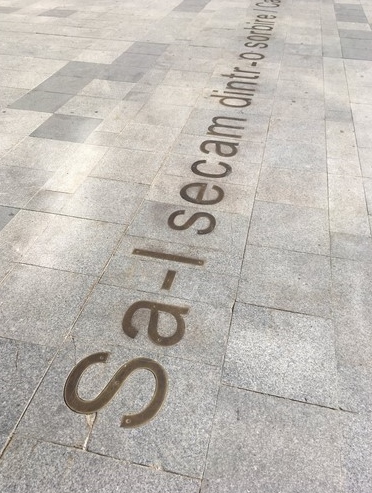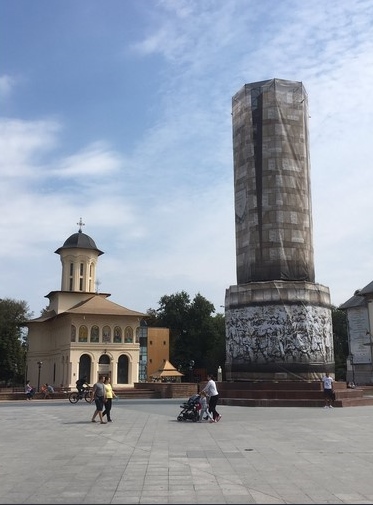19th September 2017
Britain in Focsani
One of the strands of the Embassy’s current #BritainInRomania campaign is to highlight all of the cities in Romania in which the UK has ever had a consulate or other form of diplomatic representation.
This took me earlier this month to Focșani, capital of the county of Vrancea, some three hours drive to the north of Bucharest. Focșani has an important place in Romanian history, owing much to its historic position on the border between the principalities of Moldova and Wallachia, the latter also sometimes described as Muntenia or the Țara Românească.
The city developed as an important trading centre between the two principalities. It was frequently part of the borderland between the Imperial Ottoman and Russian spheres of influence. A congress involving diplomats of the two empires met here in 1772. Evidently resulting in no lasting diplomatic success, for the Battle of Focșani in 1789 saw combined Russian and Habsburg forces defeat an Ottoman army. This was one of the decisive battles of the Russo-Turkish War of 1787-92, which saw an end to Ottoman dreams of reclaiming the Crimea, and was one of the battles which cemented the already high reputation for military prowess of Russian general Alexander Suvorov.
In the First World War Focșani lay along the strategically important Siret line, and the battles of Mărăști and Mărășești a hundred years ago, some of the bloodiest on Romanian territory in that conflict, played an important contribution to the eventual defeat of Germany and its allies. I have been honoured to lay wreaths during earlier visits to the mausolea at both places in remembrance of all those who died in these conflicts.
But the historical event with which Focșani today is most closely identified for most Romanians is its role in the “Little Unification”, the process of events which paved the way for the establishment of the modern state of Romania, which was kicked off in 1859 when both Moldova and Wallachia separately chose Alexandru Ioan Cuza as their ruler. The twenty-fourth of January, the date of his election as Prince of Wallachia, a few days after that in Moldova, is celebrated in Romania as Unification Day: 24 January was also chosen as the date in 1862 when the formal unification of the two regions, creating the United Principalities, was carried out.

During this three year period from 1859-62, the practical aspects of the unification of the two principalities were ironed out through a sixteen-member Central Commission. Focșani was chosen as its venue, as the historic border between the two principalities, which was marked by a branch of the River Milcov running through the centre of the town. The table around which the members of the Commission sat is preserved in the town’s Unification Museum.
The Romanian writer and politician Vasile Alecsandri wrote the words to the Union Hora, a characteristic Romanian circle dance which is performed on 24 January. My first visit to Focșani was on that date last year, when I joined members of the government and local people on an icy Union Square in the centre of town, dancing to the hora. The words run: “hurry on down to the Milcov, to dry it in one sip, so the great road shall pass over old borders.” Curiously, the branch of the Milcov passing through the centre of town has indeed now dried up, or at least runs only below ground. The text of Alecsandri’s poem has been laid out across the paving stones of Union Square to mark its former course.
Which brings us to Frank Fremoult Sankey. A Dr Francis Fremoult Sankey and his wife, Frances Louisa Wells, of Minchinhampton in Gloucestershire, gave birth in 1825 to a Frank Fremoult Sankey, who sadly died six days later. Three years later another son was born, whom they also named Frank. They clearly liked the name – they also had a daughter named Frances. A few years later the family moved to Malta. From there young Frank joined the army in Egypt, and seems to have reached the rank of Lt Colonel. He transferred to the Foreign Office, with appointments as a Vice-Consul in Orfa, present day Şanliurfa, and Alexandretta, present day Iskenderun, both now located in south-eastern Turkey. Archive documents place him in the latter city in 1858, but by 1860 he is referred to as the British Vice-Consul in Focșani. Clearly the role of that city as the host of the Central Commission had given it a diplomatic importance, and encouraged the United Kingdom to establish a presence there.
But while Focșani briefly had hopes that it would become the capital of the United Principalities, that role went to the larger city of Bucharest. And ironically, the very process of unification which Focșani has done so much to support led to a relative decline in the town’s fortunes – since it was no longer a border town much of its earlier role as a trading centre faded away, and it settled down to a more provincial life.
Frank Fremoult Sankey moved on, to Constanța, then known as Kustendjie. A report of 1 April 1867 from that city to British Foreign Minister Lord Stanley covers Sankey’s concerns about the treatment of Christian subjects of the Ottoman Sultan. Sankey died in Constanța in 1879. We have found no further mention of a continuing British consular presence in Focșani.
Some rather brutal urban redevelopment in the Communist period means that the echoes in the city of its historical importance do not reverberate as strongly as they might. But Focșani remains international in outlook. The mayor told me that, while the population of the city was on paper 92,000, in fact it was a permanent home for no more than 75,000 people – the rest were working in western Europe, including the UK. I met managers of the city’s major industries- the production of wine and clothing, the former seeking to develop new export markets, the latter entirely focused on overseas customers.

And I tied my visit to attend the opening of the second edition of the Focșani Blues Festival, with a truly international line up, including bluesman King Size Slim from the UK. The event was a confident statement of Focșani’s international outlook, and of the enthusiasm of the people here for the continuing development of a deep and special partnership with the UK, whether in trade or culture.